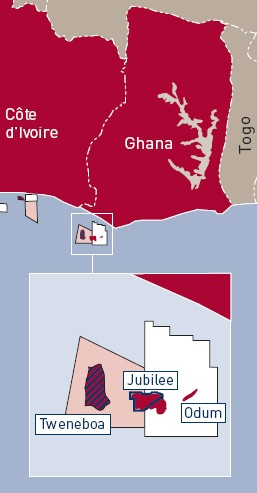|
Ghana Economy - Development More oil found offshore Ghana
The Ireland-based company Tullow Oil has reported yet another oil discovery on the Jubilee field off Ghana. The hired Atwood Hunter rig had "encountered oil in four out of five wells in the exploration and appraisal programme in the area immediately to the southeast of the Jubilee Field," Tullow's Angus McCoss said in a statement.
"Looking to 2011–12, the fiscal space created by Ghana's move to oil producer status will initially be modest," IMF analysts hold. As Ghanaians are gearing up for oil revenues and hoping for more government spending, the IMF strongly warns against such ideas before substantial oil exports are secured. "It will be important to tailor spending plans to available resources," the IMF warns the Ghanaian government. Government spending was already exaggerated and based on too many unsecure loans. The Fund therefore called for "regaining control over the budget and for prudent use of Ghana's future oil resources." Further, structures to avoid the "oil curse" were still not in place in Ghana. "Transparency in managing oil revenues and related spending will be key," the Fund's analysts advised. Also, the "the under-pricing of energy products" in Ghana was still a problem that needed to be addressed. But both the Accra government and Ghanaians at large are well aware of the oil curse, knowing all too well how nearby Nigeria has failed to profit from its enormous wealth. There is therefore a public demand in the well-founded democracy to avoid anything that resembles Nigeria in Ghana's future oil bonanza. President John Atta Mills is soon to present extensive oil management policies and legislation to the Accra parliament, following a long advising process from the IMF and other, non-Nigerian oil producing countries. By staff writer © afrol News - Create an e-mail alert for Ghana news - Create an e-mail alert for Economy - Development news
On the Afrol News front page now
|
front page
| news
| countries
| archive
| currencies
| news alerts login
| about afrol News
| contact
| advertise
| español
©
afrol News.
Reproducing or buying afrol News' articles.
You can contact us at mail@afrol.com









